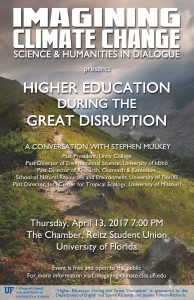A Conversation with Stephen Mulkey
7 PM, April 13, 2017
The Chamber, Reitz Student Union
University of Florida
Stephen Mulkey’s talk, Sid Dobrin and Bette Loiselle’s responses, and the Q & A session with the audience can be viewed online from the “ICC Videos” page.
 The threats to the future of our species are manifold as we move further into a century that is characterized by accelerating disruptions of climate, biosphere, and human systems. Multiple lines of evidence show that natural conditions that were favorable for the development of civilization are rapidly degrading. We are approaching an event horizon beyond which disruptions to the Earth’s living systems will be irrevocable on a millennial time scale. Climate change is transforming ecosystem function and is undermining agricultural and industrial production, reducing the ability of the global economy to support a growing population.
The threats to the future of our species are manifold as we move further into a century that is characterized by accelerating disruptions of climate, biosphere, and human systems. Multiple lines of evidence show that natural conditions that were favorable for the development of civilization are rapidly degrading. We are approaching an event horizon beyond which disruptions to the Earth’s living systems will be irrevocable on a millennial time scale. Climate change is transforming ecosystem function and is undermining agricultural and industrial production, reducing the ability of the global economy to support a growing population.
Higher education has an ethical imperative to provide the foundation of a sustainable civilization. Universities must transform themselves into institutions organized around transdisciplinary programs grounded in ecological and sustainability literacy. Undergraduate curricula should emphasize training in skills that will be needed to proactively adapt natural and human systems as they are transformed. The liberal arts are foundational to these skills. Research and graduate education must produce professionals with the ability to holistically manage the dynamic changes of the biosphere rather attempting to preserve and restore natural systems to some desired previous condition. Every institution – political, legal, economic, medical, and scientific – will need to be re-aligned to increasingly achieve a sustainable civilization. Sustainability science remains on the margins of academic life, with few resources and little prestige. The status of higher education as part of the public trust has been all but destroyed and administrations are complicit in the privatization and commodification of the university’s services. Many faculty continue to be oriented toward the questions raised within their disciplinary specialties, not toward tasks associated with transdisciplinary problem-solving. Reframing higher education to meet the challenges of accelerating disruptions will require a revolution in the purposes and structures of the university. Teaching, learning, scholarship, and research for sustainability must become the highest priorities of the university. Collectively, faculty have much of the power to implement these reforms.
For most of his career, Stephen Mulkey has been a champion of interdisciplinary research, education, and outreach in the environmental sciences. From 2011 to 2015 he was President of Unity College (Unity, Maine), where he led the College’s adoption of Sustainability Science as a framework for its liberal arts programming. From 2008 to 2011 he was Director of Environmental Science at the University of Idaho. From 1996 to 2008, he was a member of the faculty of the University of Florida Department of Botany and Director of Research and Outreach/Extension for the UF School of Natural Resources and Environment. In 1990 he co-founded and later directed the International Center for Tropical Ecology at the University of Missouri in St. Louis.For more information about Stephen Mulkey and links to his scholarship and recent lectures, see this page.
Mulkey’s talk will be followed by responses from Sid Dobrin, Chair of the UF Department of English, and Bette Loiselle, Director of the Tropical Conservation and Development Program of UF’s Center for Latin American Studies. Dobrin is the author or editor of more than twenty books, including the forthcoming EcoComix: Ecocriticism and Comics Studies and Gone. Fishing. Recreational Saltwater Fishing and the Future of the World’s Oceans. Loiselle is the author of more than 100 peer-reviewed journal papers in the fields of tropical ecology, conservation biology, and biodiversity, with particular emphasis on the flora and fauna of the Amazon rain forests of Ecuador.
This event is co-sponsored by the Department of English and Storm Richards and Jeanne Fillman-Richards. All ICC events are free and open to the public. No advance registration is required. For more information, contact Terry Harpold <tharpold@ufl.edu>.
 “Higher Education During the Great Disruption” has been certified a Green-Level Sustainable Event by the UF Office of Sustainability, in recognition of “the highest level of effort taken toward sustainability” with regard to event planning, purchasing, promotion, transportation, and hosting. For more information about the Sustainable Event Certification program see this link.
“Higher Education During the Great Disruption” has been certified a Green-Level Sustainable Event by the UF Office of Sustainability, in recognition of “the highest level of effort taken toward sustainability” with regard to event planning, purchasing, promotion, transportation, and hosting. For more information about the Sustainable Event Certification program see this link.
“Higher Education During the Great Disruption” poster by Madeline Gangnes